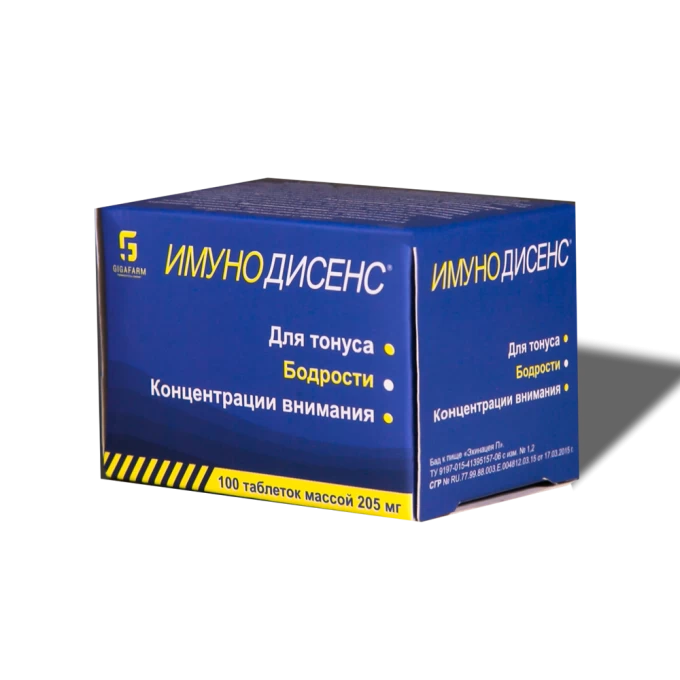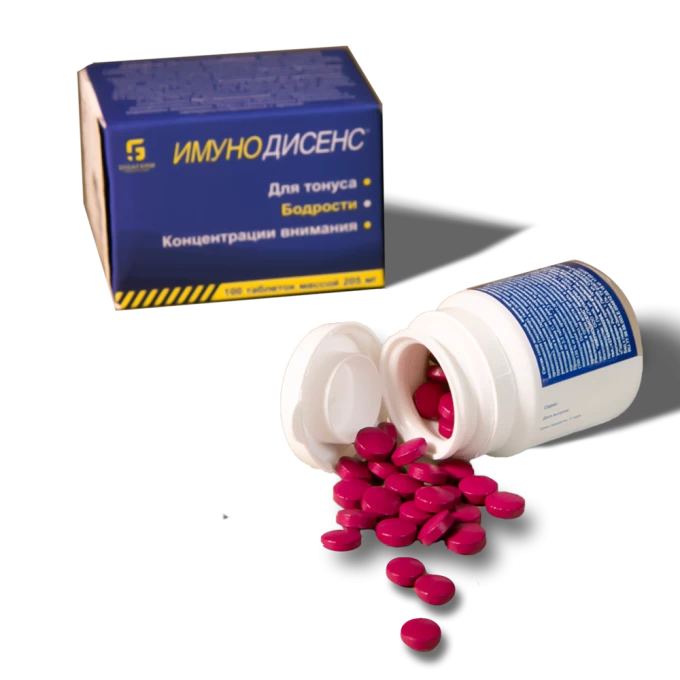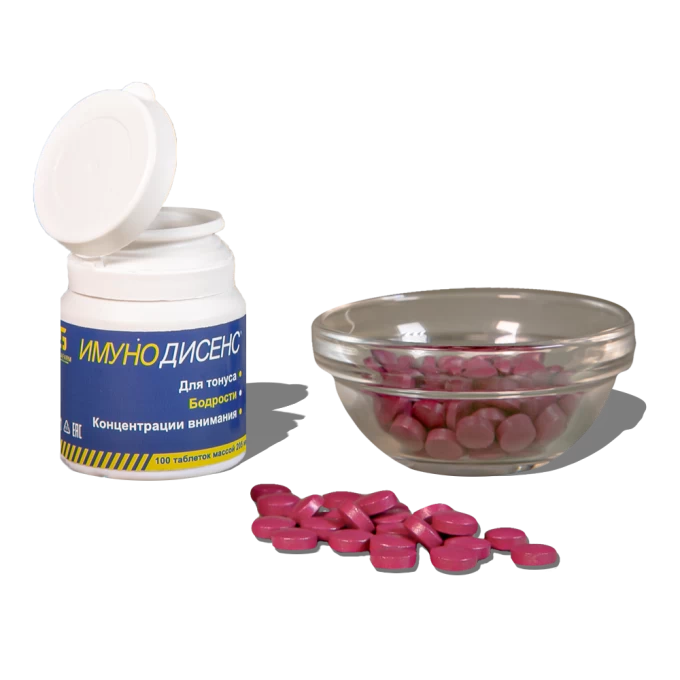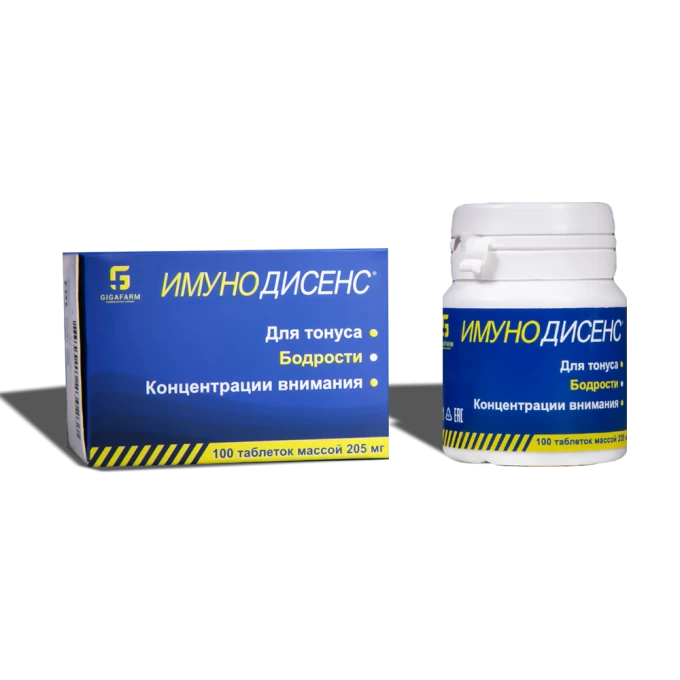IMUNODISENS N100
SHort description
Immunomodulator 100 tablets weighing 205 mg Indications: prevention and treatment of acute respiratory viral infections and influenza, in order to stimulate the immune system Ingredients: Echinacea purpurea herb powder 50 mg, vitamin C 10 mg. Adults: 2-3 pieces 3 times a day with meals, drinking plenty of water. Duration of admission: 2-3 weeks.
Share
-
Description products
IMUNODISENS
LicenseAttention! We do not produce extracts, infusions and decoctions that destroy many properties of medicinal plants. Our technology «Secrets of Longevity» uses the medicinal plant as a whole, and conveys to you all the wealth of healing properties given to us by Nature. When buying at a pharmacy, pay attention to the fact that you are not given an extract, but a preparation containing the medicinal plant itself. «Gigafarm Sage»is a very tasty dragee with the smell and taste of natural sage, it is intended for resorption.
Indications
· to effectively maintain the body's immune status;
· for the prevention of colds and flu, reducing their duration;
· as an adjuvant in chronic inflammatory diseases (rheumatism, polyarthritis, prostatitis, gynecological disorders), exposure to radiation, chemotherapy drugs, long-term antibiotic therapy;
· to inhibit the growth and reproduction of streptococcus, staphylococcus, E. coli, influenza viruses, herpes, stomatitis.
Recommendations for use
Adults: 2-3 tablets 3 times a day with meals, drinking plenty of water. The duration of admission is 2-3 weeks.
Сomposition
Echinacea purpurea, ascorbic acid. Echinacea purpurea contains polysaccharides, essential oil (flowers up to 0.5%, grass up to 0.35%, roots from 0.05 to 0.25%). The main component of essential oil is non-cyclic sesquiterpenes. Echinacoside glycoside, betaine (0.1%), resins (about 2%), organic acids (palmitic, linoleic, cerotinic), as well as phytosterols were found in the roots. The main active ingredients with immunostimulating activity are polysaccharides. The leading group of BAS is herbs and echinacea rhizomes, among which the most characteristic components are chicory acid (dicofeyltartaric acid) and echinacoside. Among the concomitant phenylpropanoids, derivatives of tartaric acid (based on n-coumaric and ferulic acids), caffeic and chlorogenic acids were also found. Interestingly, in the echinacoside molecule, a fragment of salidroside, one of the components of rhizodia rosea, is easily detected. It is this substance that can determine the revealed tonic properties of Echinecium Purpurea. The second group of biologically active compounds should be considered polysaccharides (heteroxylans, arabinoxylans, arabinoramnogalactitans), which have immunostimulatory activity. Alcamides (alkylamides) - polyene or polyacetylene compounds with an isobutylamide residue should be considered as the third group of BAS. Accompanying substances of the herb Echinacea purpurea are also represented by flavonoids (quercetin, kaempferol and various glucosides), essential oil (up to 0.6%), the main components of which are borneol, bornylacetate, caryophyllene, caryophyllene oxide, etc. The herb and rhizomes also contain inulin (in rhizomes up to 6%) betaine. Organic acids, higher unsaturated acids, phytosterols, tannins, saponins. The whole plant is rich in enzymes, microelements (selenium, cobalt, silver, molybdenum, zinc, manganese, etc.) and macroelements (potassium, calcium).
Pharmacological properties
Imunodisens is an immunomodulator. The drug has antibacterial, antiviral and antimycotic properties. The drug inhibits the growth and reproduction of streptococcus, staphylococcus, E. coli, influenza viruses, herpes, stomatitis, is effective in inflammatory diseases (rheumatism, polyarthritis, prostatitis, gynecological disorders), upper respiratory tract diseases, various wound processes (trophic ulcers, osteomyelitis), microbial eczema.
Imunodisense is also used for prophylactic purposes at the first sign of a cold, with prolonged use of antibiotics, and for the recovery of people who have undergone exposure to radiation or live in areas that are unfavorable in terms of radiation levels.
Imunodisens is used for inflammatory processes and purulent infections of the skin, soft tissues, mucous membranes (furuncle, abscess, phlegmon, carbuncle, fistula, gingivitis, stomatitis, sinusitis, gastroenteritis, enterocolitis, colpitis, adnexitis, mastitis, cystitis, glomerulonephritis, etc.) ; septic conditions and toxic syndromes (osteomyelitis, sepsis, septicemia, secondary bacterial and viral infections, protracted febrile conditions. Imunodisens is non-toxic.
When studying Imunodisens, stimulation of the production of cytokines by macrophages: IL-1, alpha-TNF and IL-6 and an increase in antibody-dependent cytotoxicity of peripheral blood mononuclear cells under the action of echinacea extract were shown. In the experiment with systematic use for 1-2 weeks. causes a significant increase in the absolute number of NK cells and monocytes in the red bone marrow and spleen.
Echinacea purpurea polysaccharides increase the resistance of immunodeficient mice to infection with Candida albicans and Listeria monocytogenes, suggesting the possibility of using echinacea preparations to treat opportunistic infections. Echinacea purpurea polysaccharides also stimulate the cytotoxicity of macrophages against tumor and microbial cells. Inhibition of free radical oxidation processes and other effects. Taking the drug helps to inhibit the process of lipid peroxidation, reduce the unsaturation of the lipid complex of sweat and blood and the level of free cholesterol.
Contraindications and side effects
Individual intolerance to the components of the product, pregnant and lactating women. It is generally accepted that it is contraindicated in diseases associated with hyperactivation of autoimmunity and when used together with immunomodulators, as well as in case of allergy to the drug. There is evidence that high concentrations of the drug can cause a deficiency of cellular immunity and damage human reproductive cells. The possibility of hepatotoxicity of the drug with prolonged use is discussed, in particular, with the combined use of other hepatotoxic drugs, such as anabolic steroids, amiodarone, methotrexate and ketoconazole.
IMUNODISENS
License
Attention! We do not
produce extracts, infusions and decoctions that destroy many properties of
medicinal plants. Our technology «Secrets of Longevity» uses the medicinal
plant as a whole, and conveys to you all the wealth of healing properties given
to us by Nature. When buying at a pharmacy, pay attention to the fact that you
are not given an extract, but a preparation containing the medicinal plant
itself. «Gigafarm Sage»is a very tasty dragee with the smell and taste of
natural sage, it is intended for resorption.
Indications
·
to
effectively maintain the body's immune status;
·
for the
prevention of colds and flu, reducing their duration;
·
as an
adjuvant in chronic inflammatory diseases (rheumatism, polyarthritis,
prostatitis, gynecological disorders), exposure to radiation, chemotherapy
drugs, long-term antibiotic therapy;
·
to
inhibit the growth and reproduction of streptococcus, staphylococcus, E. coli,
influenza viruses, herpes, stomatitis.
Recommendations for use
Adults:
2-3 tablets 3 times a day with meals, drinking plenty of water. The duration of
admission is 2-3 weeks.
Сomposition
Echinacea
purpurea, ascorbic acid. Echinacea purpurea contains polysaccharides, essential
oil (flowers up to 0.5%, grass up to 0.35%, roots from 0.05 to 0.25%). The main
component of essential oil is non-cyclic sesquiterpenes. Echinacoside
glycoside, betaine (0.1%), resins (about 2%), organic acids (palmitic,
linoleic, cerotinic), as well as phytosterols were found in the roots. The main
active ingredients with immunostimulating activity are polysaccharides. The
leading group of BAS is herbs and echinacea rhizomes, among which the most
characteristic components are chicory acid (dicofeyltartaric acid) and
echinacoside. Among the
concomitant phenylpropanoids, derivatives of tartaric acid (based on n-coumaric
and ferulic acids), caffeic and chlorogenic acids were also found.
Interestingly, in the echinacoside molecule, a fragment of salidroside, one of
the components of rhizodia rosea, is easily detected. It is this substance that
can determine the revealed tonic properties of Echinecium Purpurea. The second
group of biologically active compounds should be considered polysaccharides
(heteroxylans, arabinoxylans, arabinoramnogalactitans), which have immunostimulatory
activity. Alcamides (alkylamides)
- polyene or polyacetylene compounds with an isobutylamide residue should be
considered as the third group of BAS. Accompanying substances of the herb
Echinacea purpurea are also represented by flavonoids (quercetin, kaempferol
and various glucosides), essential oil (up to 0.6%), the main components of
which are borneol, bornylacetate, caryophyllene, caryophyllene oxide, etc. The
herb and rhizomes also contain inulin (in rhizomes up to 6%) betaine. Organic
acids, higher unsaturated acids, phytosterols, tannins, saponins. The whole
plant is rich in enzymes, microelements (selenium, cobalt, silver, molybdenum,
zinc, manganese, etc.) and macroelements (potassium, calcium).
Pharmacological
properties
Imunodisens
is an immunomodulator. The drug has antibacterial, antiviral and antimycotic
properties. The drug inhibits the growth and reproduction of streptococcus,
staphylococcus, E. coli, influenza viruses, herpes, stomatitis, is effective in
inflammatory diseases (rheumatism, polyarthritis, prostatitis, gynecological
disorders), upper respiratory tract diseases, various wound processes (trophic
ulcers, osteomyelitis), microbial eczema.
Imunodisense
is also used for prophylactic purposes at the first sign of a cold, with prolonged
use of antibiotics, and for the recovery of people who have undergone exposure
to radiation or live in areas that are unfavorable in terms of radiation
levels.
Imunodisens
is used for inflammatory processes and purulent infections of the skin, soft
tissues, mucous membranes (furuncle, abscess, phlegmon, carbuncle, fistula,
gingivitis, stomatitis, sinusitis, gastroenteritis, enterocolitis, colpitis,
adnexitis, mastitis, cystitis, glomerulonephritis, etc.) ; septic conditions
and toxic syndromes (osteomyelitis, sepsis, septicemia, secondary bacterial and
viral infections, protracted febrile conditions. Imunodisens is non-toxic.
When
studying Imunodisens, stimulation of the production of cytokines by
macrophages: IL-1, alpha-TNF and IL-6 and an increase in antibody-dependent
cytotoxicity of peripheral blood mononuclear cells under the action of
echinacea extract were shown. In the experiment with systematic use for 1-2
weeks. causes a significant increase in the absolute number of NK cells and
monocytes in the red bone marrow and spleen.
Echinacea
purpurea polysaccharides increase the resistance of immunodeficient mice to
infection with Candida albicans and Listeria monocytogenes, suggesting the
possibility of using echinacea preparations to treat opportunistic infections.
Echinacea purpurea polysaccharides also stimulate the cytotoxicity of
macrophages against tumor and microbial cells. Inhibition of free radical
oxidation processes and other effects. Taking the drug helps to inhibit the
process of lipid peroxidation, reduce the unsaturation of the lipid complex of
sweat and blood and the level of free cholesterol.
Contraindications and side effects
Individual intolerance to the components of
the product, pregnant and lactating women. It is generally accepted that it is
contraindicated in diseases associated with hyperactivation of autoimmunity and
when used together with immunomodulators, as well as in case of allergy to the
drug. There is evidence that high concentrations of the drug can cause a deficiency
of cellular immunity and damage human reproductive cells. The possibility of
hepatotoxicity of the drug with prolonged use is discussed, in particular, with
the combined use of other hepatotoxic drugs, such as anabolic steroids,
amiodarone, methotrexate and ketoconazole.





